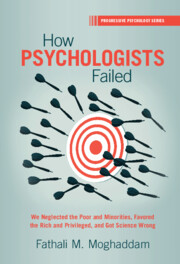 How Psychologists Failed
How Psychologists Failed Book contents
- HOW PSYCHOLOGISTS FAILED
- The Progressive Psychology Book Series
- How Psychologists Failed
- Copyright page
- Dedication
- Contents
- Preface
- Acknowledgments
- Chapter 1 Why We Must Rethink Psychology
- Part I Psychological Processes
- Chapter 2 Cognition and Decision-Making in Societal Context
- Chapter 3 Mis-measuring Intelligence and Justifying Educational Inequalities
- Chapter 4 Personality and the Power of Context
- Chapter 5 Consciousness: Decontextualized and Contextualized Approaches
- Chapter 6 Motivation and Resilience: Self-Help Myths and the Reality of Invisibility
- Chapter 7 Group Life and Diversity
- Part II Rethinking Behavior in the Larger World
- Part III Looking Ahead
- Notes
- References
- Index
Chapter 3 - Mis-measuring Intelligence and Justifying Educational Inequalities
from Part I - Psychological Processes
Published online by Cambridge University Press: 27 October 2022
- HOW PSYCHOLOGISTS FAILED
- The Progressive Psychology Book Series
- How Psychologists Failed
- Copyright page
- Dedication
- Contents
- Preface
- Acknowledgments
- Chapter 1 Why We Must Rethink Psychology
- Part I Psychological Processes
- Chapter 2 Cognition and Decision-Making in Societal Context
- Chapter 3 Mis-measuring Intelligence and Justifying Educational Inequalities
- Chapter 4 Personality and the Power of Context
- Chapter 5 Consciousness: Decontextualized and Contextualized Approaches
- Chapter 6 Motivation and Resilience: Self-Help Myths and the Reality of Invisibility
- Chapter 7 Group Life and Diversity
- Part II Rethinking Behavior in the Larger World
- Part III Looking Ahead
- Notes
- References
- Index
Summary
Attempts to objectively measure intelligence in Western societies date back to the mid-nineteenth century. From the start, some researchers were determined to demonstrate that intelligence is inherited, and some ethnic groups have relatively low intelligence. On the basis of intelligence test scores, some psychologists have argued that immigration from certain countries must be restricted because people in those countries have low intelligence and their coming to the United States and other Western countries would lower the host population intelligence level. It has also been argued that women with low intelligence are having more children, but women with higher intelligence are having fewer children, and this is causing a decline in the intelligence of the general population. In these discussions, the focus has been on traditional measures of intelligence, which use one indicator of intelligence (IQ score). But more recent research is demonstrating that intelligence is multiple, rather than singular. Second, IQ scores are increasing, not decreasing. These findings show the power of context to shape (what is assumed to be) intelligence.
Keywords
Information
- Type
- Chapter
- Information
- How Psychologists FailedWe Neglected the Poor and Minorities, Favored the Rich and Privileged, and Got Science Wrong, pp. 30 - 45Publisher: Cambridge University PressPrint publication year: 2022